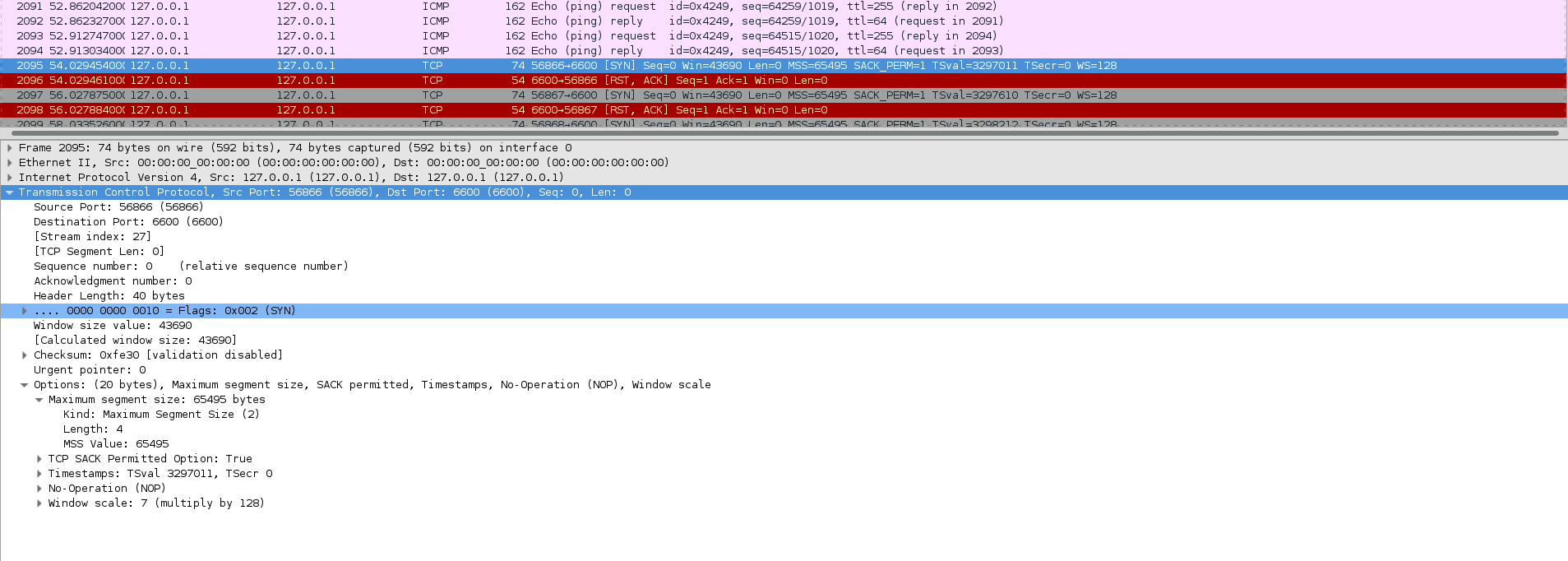Максимальный размер сегмента после отправки ICMP-пакетов
Я разрабатываю скрипт для отправки и получения данных по протоколу ICMP. Я разрезаю, шифрую, кодирую в base64 и подделываю пакеты. Мой код работает нормально, но если я пытаюсь отправить большой файл, ICMP-пакеты больше не отправляются (около 1021-го пакета кажется, что я достиг максимального размера сегмента 65495 байт.
Вот скриншот захвата Wireshark, когда событие появляется:
Если это может помочь, вот моя реализация C для подделки и отправки пакетов (я читаю из файлов данные для отправки):
#include <stdio.h>
#include <stdlib.h>
#include <fcntl.h>
#include <errno.h>
#include <sys/socket.h>
#include <resolv.h>
#include <netdb.h>
#include <string.h>
#include <netinet/in.h>
#include <netinet/ip_icmp.h>
#include <arpa/inet.h>
#include <sys/types.h>
#include <sys/wait.h>
#include <unistd.h>
#include <dirent.h>
#include <errno.h>
#include <limits.h>
#include <time.h>
#define PACKET_SIZE 128
struct packet
{
struct icmphdr hdr;
char msg[PACKET_SIZE-sizeof(struct icmphdr)];
};
int pid=-1;
struct protoent *proto=NULL;
/*--------------------------------------------------------------------*/
/*--- checksum - standard 1s complement checksum ---*/
/*--------------------------------------------------------------------*/
unsigned short checksum(void *b, int len)
{ unsigned short *buf = b;
unsigned int sum=0;
unsigned short result;
for ( sum = 0; len > 1; len -= 2 )
sum += *buf++;
if ( len == 1 )
sum += *(unsigned char*)buf;
sum = (sum >> 16) + (sum & 0xFFFF);
sum += (sum >> 16);
result = ~sum;
return result;
}
/*--------------------------------------------------------------------*/
/*--- listener - separate process to listen for and collect messages--*/
/*--------------------------------------------------------------------*/
void listener(void)
{ int sd;
struct sockaddr_in addr;
unsigned char buf[1024];
sd = socket(AF_INET, SOCK_RAW, proto->p_proto);
if ( sd < 0 )
{
perror("socket");
exit(0);
}
for (;;)
{ int bytes, len=sizeof(addr);
bzero(buf, sizeof(buf));
bytes = recvfrom(sd, buf, sizeof(buf), 0, (struct sockaddr*)&addr, &len);
if ( bytes > 0 )
printf("***Got Reply***\n");
else
perror("recvfrom");
}
exit(0);
}
/*--------------------------------------------------------------------*/
/*--- ping - Create message and send it. ---*/
/*--------------------------------------------------------------------*/
int my_ping(struct sockaddr_in *addr, char *pkt, int cnt)
{
const int val=255;
int i, u, sd;
struct packet pckt;
struct sockaddr_in r_addr;
sd = socket(AF_INET, SOCK_RAW, proto->p_proto);
if ( sd < 0 )
return 1;
if ( setsockopt(sd, SOL_IP, IP_TTL, &val, sizeof(val)) != 0)
return 2;
if ( fcntl(sd, F_SETFL, O_NONBLOCK) != 0 )
return 3;
int len=sizeof(r_addr);
bzero(&pckt, sizeof(pckt));
pckt.hdr.type = ICMP_ECHO;
pckt.hdr.un.echo.id = pid;
for(i = 0; pkt[i]; i++){
pckt.msg[i] = pkt[i];
}
u = i;
for ( i = u; i < sizeof(pckt.msg); i++ )
pckt.msg[i] = '0';
//pckt.msg[i] = 0;
pckt.hdr.un.echo.sequence = cnt++;
pckt.hdr.checksum = checksum(&pckt, sizeof(pckt));
if ( sendto(sd, &pckt, sizeof(pckt), 0, (struct sockaddr*)addr, sizeof(*addr)) <= 0 )
return 4;
return 0;
}
/*--------------------------------------------------------------------*/
/*--- ping - Create message and send it. ---*/
/*--------------------------------------------------------------------*/
int sending(struct sockaddr_in *addr, char* folderPath)
{
int status, packetSent = 0, nbTries = 0;
FILE *entry_file;
char buffer[BUFSIZ];
struct dirent **namelist;
char pathFile[PATH_MAX + 1];
int i,n;
char pkt[2048];
char *pktTemp;
int nbPkts = 1;
/* Scanning the in directory */
n = scandir(folderPath, &namelist, 0, alphasort);
printf("n == %d \n", n);
if (n < 0){
fprintf(stderr, "Scan directory can not be performed\n");
return(3);
}else {
for (i = 0; i < n; i++) {
/* On linux/Unix we don't want current and parent directories
* * On windows machine too, thanks Greg Hewgill
* */
if (!strcmp (namelist[i]->d_name, ".") || !strcmp (namelist[i]->d_name, ".."))
continue;
pathFile[0] = '\0';
strncat(pathFile, folderPath,PATH_MAX);
strncat(pathFile, "/",PATH_MAX);
strncat(pathFile, namelist[i]->d_name, PATH_MAX);
printf("\n----------------\n");
printf("File path read: %s \n", pathFile);
entry_file = fopen(pathFile, "r");
if (entry_file == NULL)
{
fprintf(stderr, "Failed to open entry file \n");
return(3);
}
pkt[0] = '\0';
packetSent = 0;
while((pktTemp = fgets(buffer, BUFSIZ, entry_file)) != NULL){
strncat(pkt,pktTemp, 2048);
}
printf("Sending Packet %d with message : \"%s\" \n", nbPkts, pkt);
printf("----------------\n");
while(packetSent == 0 && nbTries < 3){
if((status = my_ping(addr, pkt, nbPkts)) == 0){
packetSent = 1;
nbPkts++;
}else {
nbTries++;
}
usleep(50000);
}
if(packetSent == 0){
fprintf(stderr, "Connection has been lost, check if the host is alived\n");
}
/* When you finish with the file, close it */
fclose(entry_file);
free(namelist[i]);
}
free(namelist);
}
return 0;
}
/*--------------------------------------------------------------------*/
/*--- main - look up host and start ping processes. ---*/
/*--------------------------------------------------------------------*/
int main(int argc, char *argv[])
{
struct hostent *hname;
struct sockaddr_in addr;
if ( argc != 3 )
{
printf("usage: %s <addr>\n", argv[0]);
exit(0);
}
if ( argc > 2 )
{
pid = getpid();
proto = getprotobyname("ICMP");
hname = gethostbyname(argv[1]);
bzero(&addr, sizeof(addr));
addr.sin_family = hname->h_addrtype;
addr.sin_port = 0;
addr.sin_addr.s_addr = *(long*)hname->h_addr;
if ( fork() == 0 )
listener();
else
sending(&addr, argv[2]);
wait(0);
}
else
printf("Usage: ./bin <hostname> <folderPath>\n");
return 0;
}
